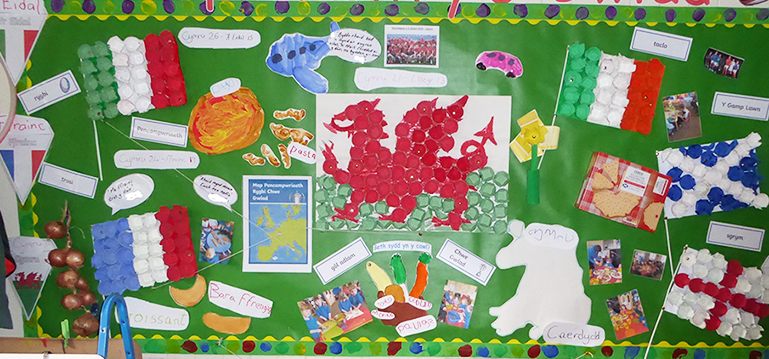Strong leadership supports exciting early education

Context and background to the effective or innovative practice
The leader’s vision is based firmly on providing exciting early education of a high standard for children in the area. She has detailed knowledge of child development, in addition to a strong understanding of the principles of the foundation phase. All practitioners have high expectations for the children and work as an effective team when discussing children’s achievement in order to plan the next steps in their learning. They ensure that all children are happy and safe and make good progress, whatever their ability.
Members of the management committee fulfil their roles highly effectively as they know the setting exceptionally well. As a result, they support the setting robustly in order to ensure standards of provision of the highest quality. They respect practitioners’ expertise and appreciate the activities and progress that children achieve at the setting.
Practitioners, the management committee and parents play an integral part in self-evaluation procedures, which are honest and prioritise teaching and learning. All stakeholders contribute towards setting clear success criteria, which are based on children’s progress. This leads effectively to very positive developments in provision.
Description of nature of strategy or activity
The leader’s experience and understanding of the principles of teaching and early education provision is masterful. Due priority is given to the learner’s voice in all aspects of the setting’s work. Practitioners listen carefully to the children and use children’s ideas as a prompt for themes, learning areas and displays. They include families when planning the theme, by seeking and benefitting from the expertise of parents and members of the local community. Practitioners weave literacy and numeracy activities skilfully across the areas of learning, including challenging activities that are relevant to the outdoor area. This has led to highly motivating provision, in which the leader has very high expectations of herself and her colleagues. Staff share information about daily activities, children’s progress and teaching strategies very successfully. This ensures that children make excellent progress.
The committee is highly supportive and proactive in acting tirelessly to support staff with their work. Lines of communication and accountability between the leader and the committee are highly effective, and this enables the committee’s officers to make informed decisions for the benefit of the children. As the committee’s officers visit the setting regularly, they have detailed knowledge of standards and teaching and learning strategies. As they know the setting so well, they understand and support the needs of provision very successfully. For example, they ensure purposeful resources that focus on raising standards and include specialist resources for individuals.
What impact has this work had on provision and learners’ standards?
As a result of robust leadership procedures, the principles of the foundation phase are implemented very successfully, and children develop their skills highly effectively.
Children’s early oracy, reading and writing skills, in addition to their numeracy skills, are developing extremely robustly. Activities such as using idioms and mathematical vocabulary when discovering which shoe fits which child in the shoe shop, stretch and challenge children. This has an effective influence on children’s perseverance and resilience when concentrating enthusiastically on their tasks. The outdoor area ensures a clear focus on developing specific literacy and numeracy skills. Practitioners question and play alongside children skilfully. This nurtures children’s desire to express themselves confidently.
The management committee has a direct effect on high standards by ensuring that all practitioners take advantage of relevant training. As a result of beneficial meetings, they are aware of the effect of training on children’s standards and wellbeing.
How have you shared your good practice?
The setting has conducted training for new leaders and foundation phase modules. Examples of provision and children’s standards of attainment have been shared regularly on a national website for foundation phase teachers and staff at non-maintained settings. Practice is shared by supporting training for schools.